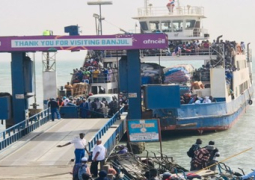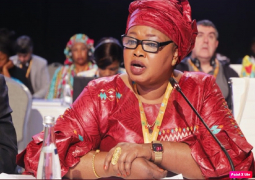
This is with a view to contributing towards reduced cost of doing business in the country.
Demurrage is also charged for containers that remain uncleared beyond the free period allowed and is fixed at a maximum of D23,000 for 20ft and D46,000 for 40ft containers, irrespective of the length of stay. Notwithstanding, waivers are usually accorded on the demurrage charges where hardship is involved.
Vehicles are charged D500 for saloon cars and D750 for Jeep, trucks and larger units.
Generally, the major causes of the high cost of basic commodities are attributable to external factors, which are beyond the control of Government.
Findings have revealed that the continuous existence of the coronavirus pandemic has disrupted global supply chains resulting in high freight cost. It is established that, for example, the freight cost to Banjul has increased by over 100% since November 2020 from an average cost of USD2, 750 [about D137, 500] per 20ft Container to USD 5,750 [about D287, 500].
The pandemic has also scaled down the global production level, and caused high prices of essential commodities in the international market. The international commodity prices have been surging from April 2020.
The price of oil, which is a determinant factor on commodity prices continued to rise from the slump in mid-2020. The Price of a barrel of Brent Crude was USD 42.3 [about D2, 115] as at November 2020 and it increased to USD 63.8 [about D3, 190] as of 13th April 2021, representing an increase of 50.83%.
The Gambia, being a net importer of food like many other developing countries, continues to feel the impact of the pandemic in the domestic market in a form of price hikes because of these externalities.
It is still worthy of note that despite the external factors on the domestic price of commodities, some of the internal factors may exacerbate the situation. These include demurrage charges levied on importers by shipping lines as a result of the congestion at the Port; the reintroduction of 20% reduction of the indicative values by the Gambia Revenue Authority [GRA]; the registration fees of Food Safety and Quality Assurance (FSQA) by food establishments; some of the local fees charged by shipping lines; increases in the freight levy charged by Gambia Maritime Administration, among others.
Despite the fact that most of these actors operate within the maritime domain, it is usually a misconception that it is the Port that is responsible for all the increases in the cost of business transactions.
The main collaborator of the GPA in goods clearance at the Port of Banjul, which the GRA operates a self-assessment regime under the ASYCUDA platform whereby importers make their own declaration depending on the relevant commercial transactions, thus serving to facilitate trade.
The GPA has also implemented efficiency improvement measures to address the increased demand on the Port facility due to the growth in volume over the past 4 years that is the major cause of the congestion.
These are interim measures to alleviate the situation, while public tender has commenced for the preliminary engineering design and ESIA for capacity improvements under the 4th Banjul Port Expansion Project.
Government is, according the necessary support for the realization of the project development needs of the Port to enhance its potential to sustain and improve productivity and faciltate trade to reduce the cost of doing business.





